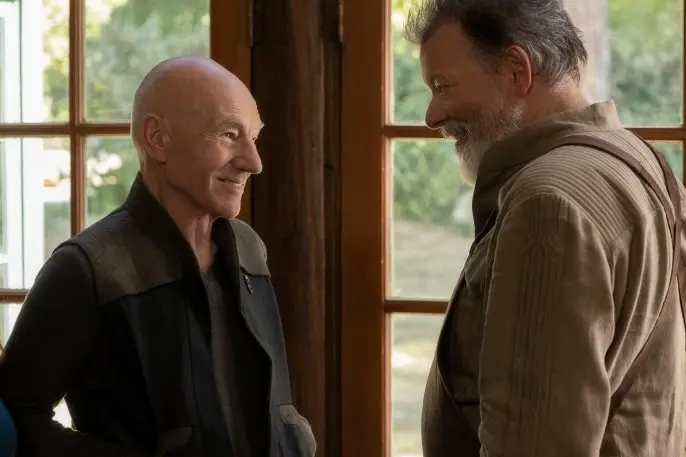I’m not normally one for karma or fate, but I have to believe that Jan. 23, 2020 is going to be one of those historical days for me–right behind (certainly not equal to, that would be wrong!) the birth of each of my children. This is the day when a man who has shaped my understanding of true leadership comes back. I’m talking about the premiere of “Star Trek: Picard” on CBS All Access.
For those of you who aren’t Trekkies, try to stay with me on this.
The date is special for that reason alone. But it’s kismet because exactly 60 years earlier, another Piccard (with one extra ‘c’) explored a different final frontier where no man had gone before. On January 23, 1960, Jacques Piccard, a Swiss oceanographer, joined Don Walsh in their (sea-, not star-) ship, the Bathyscaphe Trieste, and became the first men to descend 35,810 feet (deeper than Mount Everest is high) into the Mariana Trench in the Pacific Ocean.
I really don’t know much about Jacques Piccard. But the other Picard is my fictional hero and mentor.
Played by the (dare I say dashing) Patrick Stewart, Picard not only kept me glued to the screen when Star Trek: The Next Generation aired from 1987 to 1994, he taught me lessons I’ve taken to heart throughout my career as I explored strange new worlds in corporate America.
For those of you older than the millennials I work with at our San Francisco-based venture-backed startup, you’ll remember Captain James Tiberius Kirk of the original 1960s Star Trek series. Being Canadian myself, I’m loathe to say anything bad about other Canadians. But, really William? Even Disney Plus would be challenged to write a warning about Captain Kirk’s “outdated cultural depictions.”
I admired Captain Kathryn Janeway (Kate Mulgrew) of Star Trek: Voyager, who was the franchise’s first female lead character and showed that women in charge can be just as capable as men. As the cofounder of three nonprofit organizations that work to advance women in business, I say, “Bravo, Captain Janeway!”
But my heart belongs to Picard. He is the definition of 24th century Renaissance: a person whose interests include not only space exploration and adventure, but wine, archeology, horseback riding, and literature. Picard is widely thought of as an INTJ (introverted, intuitive, thinking, judging) personality type on the Myers-Briggs Indicator test–an analytical problem-solver. (I’m an INTJ too, just saying.)

So as this premiere approaches, I’ve taken the time to reflect on the leadership lessons I’ve learned from one of the greatest captains of all time.
You need a diverse team to navigate new adventures
Picard’s reports included a blind Somalian, an android, a Klingon warrior, a swaggering commander, a telepathic humanoid, and a medical officer. I have to admit, I’m still working on finding gender balance in my teams. And I slip into expecting people to act, and react, like me more often than I would like to admit. But then I think to remember how Picard masterfully recognizes and leverages his team’s different skills—analysis, empathy, courage, logic, risk-taking—and learns from all of them. That makes me work to #BeBetter, which is one of the values of our company.
Stand by your values, and stand up to authority when it’s wrong
Perhaps it’s my legal background, but I’m a sucker for a person advocating for civil rights. In “The Measure of a Man” (Season 2, Episode 9), Picard defies authority to save Data from being disassembled. But he doesn’t defy his commanding officers behind their backs. He fights them in space court, arguing for his belief in the individual rights of all beings, regardless of “race.” To his commander, Picard says “Starfleet was founded to seek out new life. Well, there it sits waiting.” And, “Starfleet is not an organization that ignores its own regulations when they become inconvenient.” This dialogue is more relevant to today’s leaders than at any time in my lifetime.
You need to be diplomatic
In “The Wounded” (Season 4, Episode 12), a well-liked starship captain goes rogue and begins destroying vessels of the extraterrestrial species the Cardassians (not to be confused with the Kardashians). The Federation Starfleet and Cardassia are enemies that had recently signed a treaty. Picard, thanks to his negotiating talent, is able to broker a fragile peace between the Federation Starfleet and Cardassia. He even invites a Cardassian commander and two of his officers aboard Enterprise as observers. The lesson? The best leaders never run roughshod over other people. They’re artful collaborators, able to build trust even with adversaries.
Don’t just tell—Do
Ok. I modified a line from Yoda, another great fictional mentor. But in “Booby Trap” (Season 3, Episode 6), Enterprise suffers power losses after getting caught in a trap set by the enemy Menthars. Following a series of unsuccessful technological moves to fix the problem, Picard decides to take a manual approach. He takes Enterprise’s helm and deftly removes the ship from the trap and then makes moves to ensure other vessels can’t get caught in it.
So many leaders spend their careers telling people what to do, but true credibility comes with showing you can get it done yourself when necessary. “Make it so,” as Picard was always saying.
It’s not about being right
Or being strong. It’s about being human. Despite his position and formidable gifts, Picard was incredibly humble. He never boasted. He was prone to observations such as, “It is possible to commit no mistakes and still lose. That is not weakness, that is life.”
So back to the date I’ll be waiting for. It’s the 60th anniversary of Jacques Piccard’s voyage to explore a world no human had ever been before to seek out life in the depths of our oceans. And it’s the beginning of the next chapter of Jean-Luc Picard’s leadership adventure.
Mona Sabet is chief corporate strategy officer at UserTesting, a human insights platform. She has two decades of experience in the tech sector both as a corporate executive and an entrepreneur and is actively involved in a number of nonprofits focused on improving diversity in the workplace.
Recognize your brand’s excellence by applying to this year’s Brands That Matter Awards before the early-rate deadline, May 3.
